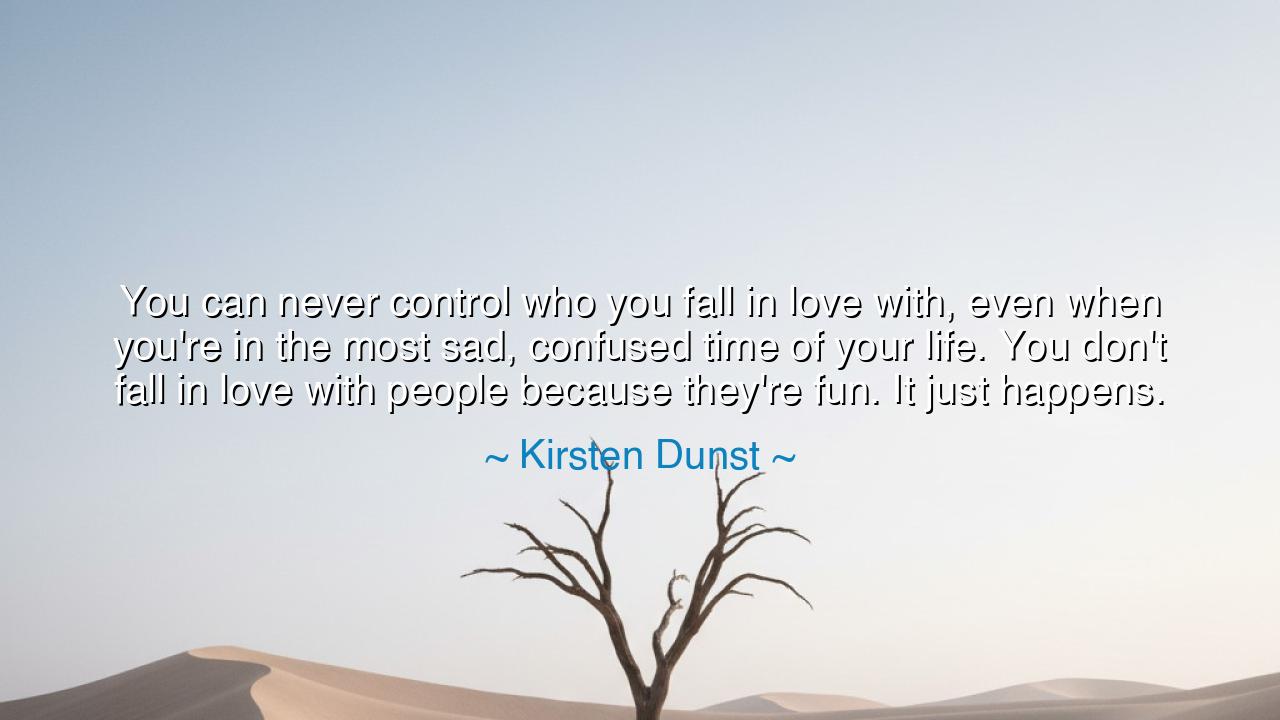
You can never control who you fall in love with, even when you're
You can never control who you fall in love with, even when you're in the most sad, confused time of your life. You don't fall in love with people because they're fun. It just happens.






In the heartfelt words of Kirsten Dunst, we find a truth as old as time itself: “You can never control who you fall in love with, even when you're in the most sad, confused time of your life. You don't fall in love with people because they're fun. It just happens.” These words, spoken with the honesty of one who has lived and felt deeply, remind us that love is not a matter of choice but of fate, not an act of calculation but of surrender. The ancients would have said that love is a divine madness — a force that seizes the heart without warning, reshaping the soul in its grasp. Dunst’s reflection echoes this eternal mystery, teaching us that love does not wait for convenience or clarity; it arrives unbidden, often in our darkest hour.
The origin of this quote lies in Dunst’s musings on the unpredictable nature of human affection. Like many who have walked the path of fame and introspection, she observed how love defies logic — how it strikes not when life is calm and orderly, but when the heart is uncertain and vulnerable. This is because love, in its truest form, is not born of perfection but of recognition — the sudden, wordless knowing that another soul carries a piece of our own. It is this mystery that renders love both wondrous and terrifying: it happens beyond will, beyond reason, beyond control.
The ancients spoke often of this truth. The philosopher Plato, in his Symposium, described love as the longing of one half for another — a desire to be whole again. It was not something chosen, but something remembered from before birth, a divine summons that the soul cannot resist. The poet Ovid, too, warned of love’s uncontrollable power, writing, “We are all driven by the same madness; love is the master of us all.” In these teachings, as in Dunst’s words, we find the same wisdom: love descends not as a reward, but as a revelation. It shows us who we are by dissolving our illusions of control.
Consider the story of Héloïse and Abélard, two souls whose love in the 12th century defied every rule of their time. Abélard was a scholar, Héloïse his student; their bond began in secrecy and ended in tragedy, yet through suffering they discovered a love so profound that even separation could not destroy it. Their letters, filled with sorrow and wisdom, reveal what Dunst’s quote captures in simpler words — that love does not wait for the right moment, nor does it care for propriety or logic. It comes like lightning to the heart, beautiful and destructive, illuminating all that we are.
“You can never control who you fall in love with,” she says, and in this truth lies both warning and blessing. Love’s unpredictability means it can lead us into pain — to fall for someone when life is chaotic, when we are broken or afraid, can seem like folly. Yet it is often in these fragile moments that love’s power is greatest. For love, when genuine, does not demand that we be whole; it helps us to become whole. It enters through the cracks of our confusion and sadness, not to fix us, but to awaken us — to remind us that even in the storm, the heart still longs to give and to receive.
Dunst’s reflection that “you don’t fall in love with people because they’re fun” reminds us that love is not amusement, not a pastime, but a revelation of the soul. Fun fades, charm diminishes, but the recognition of a kindred spirit endures. Love begins when something eternal in one person calls out to the eternal in another — something beyond words, beyond surface pleasure. It is not the smile or the laughter alone that binds two hearts, but the silent knowledge that one has been seen, truly seen, and still accepted.
Thus, the lesson of this quote is both humbling and profound: do not try to master love; let it master you. When it comes, receive it with reverence, even if it arrives in sorrow or uncertainty. Do not demand that it fit your plans, for it is older than your plans, and wiser than your mind. Love is not a choice to be made, but a gift to be honored — one that reveals life’s beauty even in its pain. If it breaks you, let it break you open. If it confuses you, let it teach you patience. For as long as you can still fall in love, even in your most troubled hour, it means your heart remains alive — and that, above all, is the greatest grace.
So remember, as the ancients once did and as Kirsten Dunst reminds us now: love will come when it will, and in whom it will. It will humble you, challenge you, and awaken you. And though you cannot control it, you can honor it — by letting it make you more tender, more courageous, and more human. For the true miracle of love is not that it happens at the perfect time, but that it happens at all — even when the soul is lost, even when life is dark, and even when we least deserve it.






AAdministratorAdministrator
Welcome, honored guests. Please leave a comment, we will respond soon